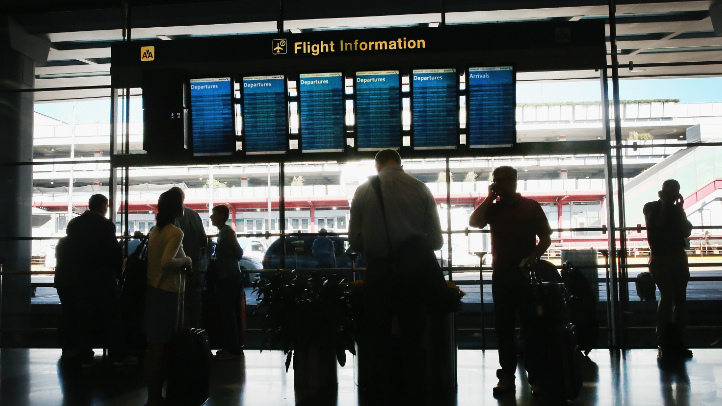As the omicron COVID-19 variant continues to surge throughout the U.S., more people are asking how well the vaccines protect against the new strain.
As of last week, omicron likely accounted for 90% of COVID cases in areas like the Midwest, according to Centers for Disease Control and Prevention director Dr. Rochelle Walensky.
In Illinois, the department of public health reported 177 omicron cases on Tuesday, which is up from the 71 reported last week and 17 earlier that same week.
But how well will the vaccine protect you from contracting the new strain? Here's what we know.
Feeling out of the loop? We'll catch you up on the Chicago news you need to know. Sign up for the weekly Chicago Catch-Up newsletter here.
COVID Vaccine Efficacy
Vaccine efficacy has been a main question as both the omicron and delta COVID variants continue to spread around the country and the globe.
Health experts have said that a majority of hospitalizations and deaths associated with the delta variant in recent months have largely been in unvaccinated individuals. The CDC has said the risk of infection is 8x higher in the unvaccinated than the vaccinated, and the risk of hospitalization or death is 25x higher.
Local
But is one better than the other at protecting against breakthrough infections in vaccinated populations?
"No vaccine is perfect, for one thing," said Dr. Egon Ozer, who works in infectious diseases at Northwestern Medicine. "No vaccine is going to be a magic bullet. So, especially with so much virus that’s still circulating, there’s always potential that there’s going to be some breakthrough, that people are still going to be able to get some degree of the virus. That’s certainly been the case with delta, as well.”
Scientists don't yet know how big a threat the omicron variant really is or if it will affect protection given from current vaccines. Currently the extra-contagious delta variant is responsible for most of the COVID-19 cases in the U.S. and other countries.
In Chicago and multiple Midwestern states, early cases of the omicron variant have appeared in fully vaccinated residents, some of whom also received booster doses, though symptoms have so far remained mild.
The omicron variant, discovered late last month, carries an unusually large number of mutations and scientists are racing to learn how easily it spreads, whether it causes illness that is more serious or milder than other coronavirus types — and how much it might evade the protection of prior vaccinations.
Based on the latest data, Arwady said omicron appears to be twice as contagious the delta variant.
"We are still learning. Lots of you are asking, 'Are we going to need an omicron booster? We might," Arwady said. "We’ll know in another two weeks or so once all the data has been collected related to how well not just has the vaccine been protecting around the world, but has the booster been protecting. How well has 'natural immunity' been protecting? Because we've been seeing a lot of folks who were kind of counting on prior infection getting infected again with this omicron variant in other parts of the world."
Moderna's Chief Medical Officer Paul Burton said the vaccine maker could also roll out a reformulated vaccine against the omicron coronavirus variant early next year.
Pfizer said that while two doses of its vaccine may not be protective enough to prevent infection, lab tests showed a booster shot increased by 25-fold people's levels of virus-fighting antibodies.
While Moderna's two-dose vaccine remained "durable" six months after the second shot, immunity against the coronavirus will continue to wane and eventually diminish vaccine efficacy, the company has said.
The company said its vaccine is 93% effective six months after the second dose. By comparison, Pfizer and BioNTech said their vaccine efficacy declined to around 84% after six months.
Johnson & Johnson reported over the summer that data showed their vaccine "generated strong, persistent activity against the rapidly spreading delta variant and other highly prevalent SARS-CoV-2 viral variants."
Pfizer's Booster Shot and Omicron
Pfizer said this month that a booster dose of its COVID-19 vaccine may offer important protection against the new omicron variant even though the initial two doses appear significantly less effective.
Pfizer and its partner BioNTech said that while two doses may not be protective enough to prevent infection, lab tests showed a booster increased by 25-fold people's levels of virus-fighting antibodies.
Blood samples taken a month after a booster showed people harbored levels of omicron-neutralizing antibodies that were similar to amounts proven protective against earlier variants after two doses.
Moderna's Booster Shot and Omicron
Moderna said last week that its COVID-19 booster does appear to provide protection against the omicron variant.
In an announcement, the drug company said preliminary data from lab testing found the version of its booster currently in use in the United States and elsewhere provided increased antibody levels to neutralize the virus. But it also found that a double dose of the booster shot provided a much greater increase in those levels.
The drug company said its currently FDA-approved 50 microgram booster was found to increase neutralizing antibody levels against omicron 37-fold compared to pre-boost levels. Meanwhile, it found that a 100 microgram booster dose gave an 83-fold increase in neutralizing antibody levels.
Omicron-Specific Booster Shots
Pfizer and BioNTech already are working to create an omicron-specific vaccine in case it’s needed.
Moderna's Chief Medical Officer Paul Burton said the vaccine maker could also roll out a reformulated vaccine against the omicron coronavirus variant early next year.
Even after the early findings on its booster, the company said it would still be working to develop an omicron-specific booster, with the shot expected to advance into clinical trials in early 2022.



